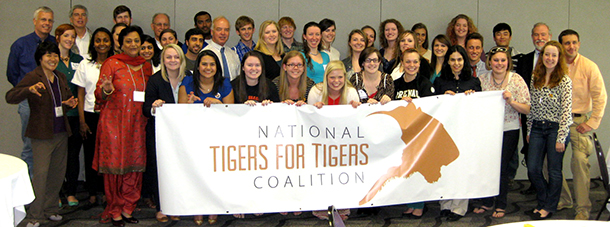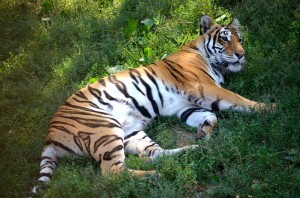?What do you want to be when you grow up??
Address the question to a classroom full of kindergarteners, and you?re bound to find the next generation of superheroes and Disney princesses among the sea of bright-eyed faces. As children, we are taug ht that we can be whatever we want to be if we work hard and believe in ourselves. As adults, we have to begin to think more practically, and those of us who choose to pursue our childhood dreams are often viewed as foolish or na?ve.
ht that we can be whatever we want to be if we work hard and believe in ourselves. As adults, we have to begin to think more practically, and those of us who choose to pursue our childhood dreams are often viewed as foolish or na?ve.
When I approached my college professors with the idea of becoming a big cat keeper, most of them thought I was crazy. They laughed good-naturedly at what they assumed to be a joke, then (when they realized I was serious) smiled sympathetically and told me that I should probably consider finding a ?real? job. The truth is that most of them just didn?t know where to begin.
If you?re looking to find a job at a big cat sanctuary, it?s best to start preparing early. While many schools have programs designed to train students to work with domestic animals or native wildlife, few, if any, can fully equip someone with the knowledge and skills necessary to work in exotic animal husbandry, so it?s important to learn as much as you can and gain as much experience as possible. In high school, this might mean taking biology-related elective courses, getting involved in animal organizations (such as an animal welfare club or FFA), and exploring the library?s collection of books on big cats in your free time. It?s also a good idea to start looking for opportunities to volunteer at local animal shelters, vet clinics, zoos, or wildlife rehab facilities. Even if the animals you?re working with aren?t big cats, future employers (and internships) often give preference to people with experience in animal care.
At the university level, you have more options to focus your studies on a particular area of interest. Look for schools with programs available in biology, animal science/technology, veterinary technology, wildlife management, or zoology. While not all positions require a degree, it?s helpful to have a background in animal studies of some sort. Additionally, colleges offer a wide variety of clubs and student services that can help you begin networking with professionals in your field. If you happen to attend one of the forty-six U.S. schools that have a tiger for a mascot, you may want to enquire about the university?s Tigers for Tigers program, a national organization of colleges dedicated to protecting the animals in captivity and preserving the species in the wild.
College is also the time when you should start looking for internships. Most big cat keeper positions require at least a year of zoo animal experience with an emphasis in large carnivore care, and the connections made through internships can be vital to finding a job. If you?re unsure where to look, the Association of Zoos and Aquariums (AZA), the American Association of Zookeepers (AAZK), and the Global Federation of Animal Sanctuaries (GFAS) all have job boards which regularly post available openings for both internships and full-time jobs. While browsing, consider taking the opportunity to look at the specific requirements for jobs that interest you, even if you don?t qualify. This will help you get a better idea of the sort of experience you need so that you can cater your internships to suit the position. Most internships are not paid, but many of them do offer housing and/or a small food stipend, and in the long run, if you can afford to do it, the experience will pay for itself.
Last but not least, be sure to maintain an updated professional resume and cover letter. When describing your work experience, highlight any skills and abilities that might be useful as a keeper, such as animal training, food sorting/preparation and feeding, cleaning animal enclosures, creating enrichment items, etc. Other skills not specifically related to animal care that may be of use include public speaking (if the position involves giving tours/keeper talks), retail experience (gift shop), basic computer skills, woodworking, and maintenance/repair work.
The job of a big cat keeper is a highly coveted position among people in the animal field. It?s a dream job?the one everyone wants but which seems impossible to obtain. But as habitat loss and poaching continue to threaten the survival of big cats in their native range, it becomes increasingly important that there are people available to care for these animals in captivity and help them act as ambassadors for their species in the wild. Someone must speak up for them. Someone must give them a voice. And if you?re willing to put in the effort, there?s no reason to believe that someone couldn’t be you.

